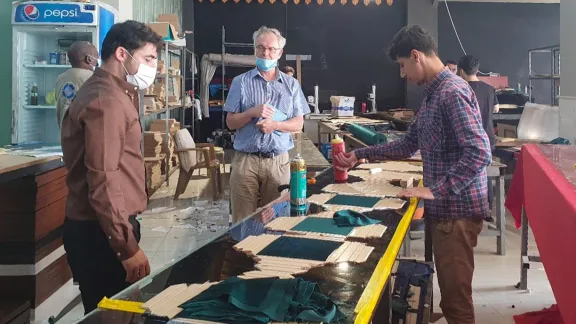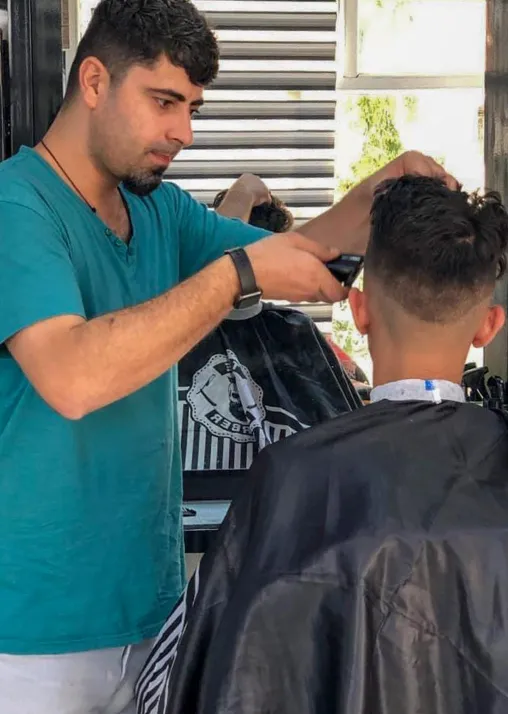
Sardar Saleh Hasan, from the host community in Dohuk, participated in the QUEST project to improve his photography studio. Photo: LWF Iraq
Supporting livelihoods in a country recovering from conflict
(LWI) - From people who lost everything to successful businesspeople in their new communities: In Iraq, LWF helps people rebuild their livelihoods. Through financial workshops and small business grants, displaced people and vulnerable communities receive tools to start or restart a business – in some cases, very successfully.
Although the IS insurgency happened ten years ago, Iraq still has 1.14 million internally displaced people. It also hosts more than 300,000 refugees from neighboring countries, mainly Syria. Even though the so-called IS insurgency was finished in 2017, their situation remains precarious, says Helan Remzi Muhammed, LWF Iraq program coordinator.
From aid to development
"The remaining needs of forcibly displaced populations in Iraq are largely driven by socio-economic factors, human rights deficits, and the absence of the rule of law – and not anymore by their displacement status," adds Muhammed. The long history of conflict in Iraq makes it difficult for anyone to have a stable income or to build up a business. This is especially true for marginalized groups who struggle to access public services.
For this reason, aid agencies in Iraq shifted from humanitarian relief to development work, trying to rebuild the country through people's livelihoods.

Niyyar Yakoub in his barber shop in Dohuk. Photo: LWF Iraq
The PROSPECTS partnership is most prominent. The project is spearheaded and funded by the Government of the Netherlands, and implemented by UN agencies such as UNHCR and UNICEF, the International Finance Corporation (IFC), the International Labour Organization (ILO), UNICEF and the World Bank, and smaller NGOs like the LWF. The partnership aims to support startups. While the private partners connect project participants to local banks to secure loans, LWF conducted business and finance training for almost 3,000 participants.
Three years after starting the project, the first businesses established themselves. Among them are the barber shops of Nijyar Yacoub. He had already earned a reputation as an exceptional barber in Mosul in 2014 but lost his business after being displaced. In the PROSPECTS Program, Nijyar Yacoub learnt budgeting techniques, effective saving strategies, loan management, and proper documentation.
"With these new skills, he approached the Middle East Bank, secured a loan, and opened his second barbershop. Today, his barbershops have evolved into vibrant community hubs. They provide employment and serve as an inspiration to others," Remzi Muhammed says.
Social cohesion
PROSPECTS is new territory in terms of partnerships for the LWF, but LWF Iraq's key activity is to equip former business owners and young people to start small enterprises.
While LWF is responsible for the training part of the PROSPECTS initiative, it has a much more comprehensive role in the business recovery project QUEST, supported by Kerk in Actie. Through this project, LWF helps businesses recover by granting loans, accompanying business development, and connecting small businesses through social cohesion activities. The project targets small business owners who have been in business for at least one year.
It is a challenge for many to access loans to grow and expand their startup, which they often finance from their savings. "Due to the area's property issues and legal laws, people not from the region have trouble securing a loan," explains Remzi Muhammed. LWF secured the support of a local bank to offer small, interest-free loans to host communities, internally displaced persons, and Syrian refugees
We see a general change in people's attitudes and their ability to cope with conflicts and their situations. We have built their resilience.
Helan REMZI MUhammmed, LWF Iraq Program Coordinator
Building resilience
One of them was Zhivan Mohammed Ismael, a 43-year-old owner of a carpenter workshop in Dohuk, Kurdistan. With this financial support, he expanded his business, which specialized in building and repairing furniture, and doubled his workforce from nine to 18 employees. As a successful entrepreneur, Zhivan now encourages fellow community members to seek out programs like the LWF project to foster local economic development and create more employment opportunities for the youth in his community.
It is hard to predict the success of these startups. LWF works with community consultations and surveys to see what kind of business is needed, and is likely to succeed in a community. The value of the projects goes beyond the cash income from a carpentry workshop. "These people now know how to access development services and financial education. Joint workshops for displaced people and host communities have improved social cohesion. We see a general change in people's attitudes and their ability to cope with conflicts and their situations. We have built their resilience," she concludes.


